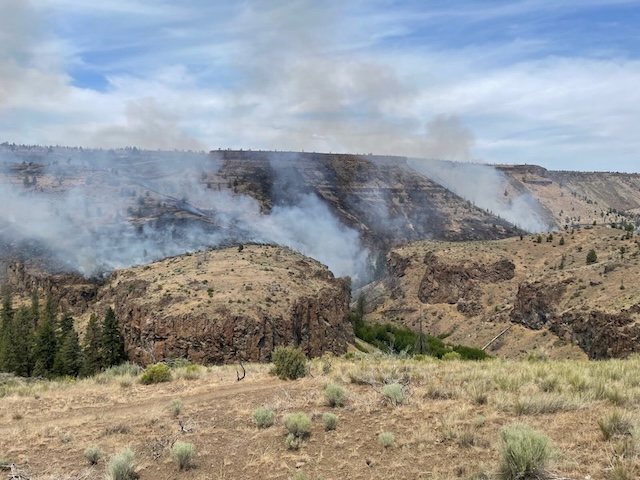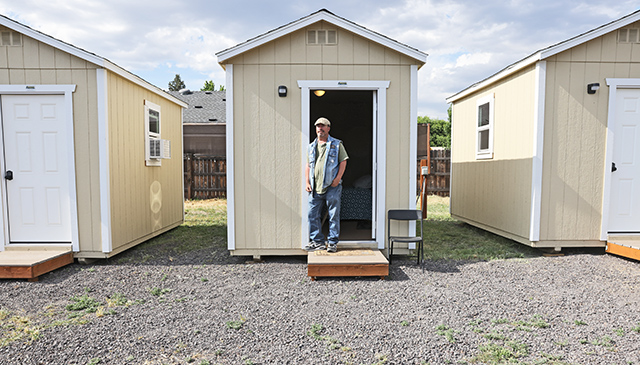Merkley defends Prineville plan
Published 5:00 am Saturday, September 1, 2012
PRINEVILLE — Legislation that aims to divide the water from the Crooked River among stakeholders is not expected to significantly drop the water level in Prineville Reservoir, Sen. Jeff Merkley, D-Ore., said Friday.
Merkley spoke to more than 50 Crook County residents, many concerned that the senator’s bill would drain the popular boating and fishing lake.
The bill would allocate more water for the city of Prineville, allow for a hydroelectric project below the reservoir and guarantee water supplies for irrigators.
It has the support of irrigators, environmental groups, the Confederated Tribes of Warm Springs and city and county officials.
But one provision has locals worried. The bill says all water not allocated to irrigators or the city will be managed for the benefit of fish species downriver, namely salmon and steelhead.
Chuck Lang, a Prineville resident and conservation director of the Oregon Bass Federation Nation, said he is concerned water will be flushed downriver for fish and lake levels will drop. Shallower lake levels could kill bass spawns along the shoreline and result in larger algae blooms and degraded water quality, he said.
“It’s going to turn into a stinky, useless lake, at least for recreation,” he said.
Under Merkley’s bill, the Bureau of Reclamation, the tribes and the Oregon Department of Fish and Wildlife will decide when and how much water is sent downriver from the reservoir to benefit fish.
Merkley said it’s in the best interests of those water managers to keep the lake full. If they draw down the reservoir one year to benefit fish there could be insufficient water for the fish the following year if it’s a dry one, he said.
Still, it’s unknown exactly what will happen to water levels in the Prineville Reservoir if Congress passes Merkley’s bill, called the Crooked River Collaborative Water Security Act.
The Ochoco Irrigation District, which supports the bill, developed models of the river system from 70 years of water data. It’s likely that lake levels won’t drop significantly during the summer recreation season, as snowmelt keeps the lake brimming and downriver flows are high then anyway, said district manager Mike Kasberger.
“While it will lower the lake levels, the lake will still be very useable,” he said of the bill.
The reservoir, about 15 miles southeast of Prineville on the Crooked River, is a popular spot for anglers and water skiers. There are an estimated 575,000 visits to the Prineville Reservoir and the nearby Ochoco Reservoir each year, providing about $6.7 million in economic benefits, according to the Bureau of Reclamation.
Rick Mayers, who owns the Prineville Reservoir Resort, is concerned lower lake levels will impact fishing, make boat ramps unusable and hurt his business.
“It’s going to affect the economy of the county because when people know the lake is low they’re not going to come,” he said.
Mayers wants an amendment to the bill that guarantees the lake level can’t drop below a certain point.
The crowd Friday was at times hostile and grilled Merkley and local officials about why the bill allows outside groups, like the tribes and the Bureau of Reclamation, to control water in the reservoir.
City Manager Steve Forrester said the bill is a compromise. The bill guarantees water for the city and irrigators and protects that water from environmental litigation in exchange for water downstream for fish, he said.
“This legislation protects Prineville,” Forrester said. “What we have now is no protection.”
The bill allows the city to pump 5,100 acre-feet of water a year for homes and businesses and guarantees irrigators 80,000 acre-feet of water annually.
Another provision removes the “wild and scenic” designation from a quarter-mile of river just below the reservoir, allowing Portland General Electric to potentially build a hydroelectric plant there.
The bill, co-sponsored by Sen. Ron Wyden, D-Ore., was assigned to the Senate Committee on Energy and Natural Resources. A similar bill sponsored by Rep. Greg Walden, R-Ore., passed the House in June.






